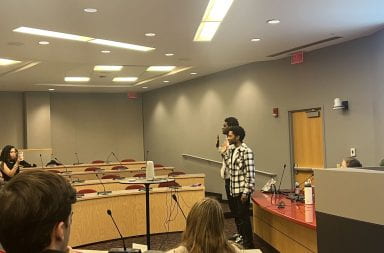Sunday was Steve Jobs’ second posthumous birthday. Jobs, who would have been 58, is remembered as a technological genius, but his true genius lies in his financial impacts.
Jobs’ creative genius was in his company’s ability to sell you a device that allowed you a better life, a computer that felt personal, creative and inventive, a computer that felt as though it were an extension of your innermost self. In a 1985 interview with “Playboy,” Jobs explained this manner of computer, made for “a different type of person – a person who doesn’t want to wait five or 10 years to have someone take a giant risk on him or her. Someone who really wants to get in a little over his head and make a little dent in the universe.”
Jobs explained how he came to do so in a June 2005 Stanford commencement. Jobs never finished his Reed College degree.
“Here I was spending all of the money my parents had saved their entire life. So I decided to drop out and trust that it would all work out OK. It was pretty scary at the time, but looking back, it was one of the best decisions I ever made,” he said in the address.
After withdrawing, he was able to audit classes. While living on a friend’s dorm room floor, collecting and recycling Coke bottles for the five-cent rebate to pay for his meals, Jobs audited a calligraphy course.
“I learned about … what makes great typography great. It was beautiful, historical, artistically subtle in a way that science can’t capture,” he said during the address. “Ten years later … it all came back to me. And we designed it all into the Mac. It was the first computer with beautiful typography.”
That was the creative genius of Jobs, which created a world of loyal customers.
In his later years, through iTunes, the iPod, the iPhone and the iPad, the financial genius of Steve Jobs appeared. Apple consumers were handed a device that allowed them to thank Apple to an infinite degree, getting more and more in over their heads, and in doing so, creating their own world.
This was the true genius of Jobs: he made your Apple product an Apple store. Open 24 hours a day, 365 days a year – never taking a sick day, never a snow day, never a holiday. All you had to do to increase that risk Apple took on you was spend, using your device to do so.
To this day, each Apple product is a perpetual Apple purchase – one app begets another, one song begets another, one device begets a person-by-person ability to consume. This creates an income stream for Apple, and this is Jobs’ true lasting legacy as a business man.
Jobs’ true genius was his financial genius, and the invention of the impossible: the perpetual income device.


